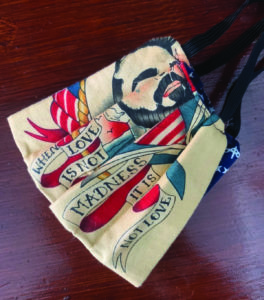PROVINCETOWN — Outdoor dining for restaurants, new picnic areas on town property, an experimental car ban on Commercial Street, and extra oversight of the excursion fleet were all approved at a two-part meeting of the select board and board of health on Thursday, May 28, and Monday, June 1. Both boards affirmed many of the town recovery coalition’s recommendations, establishing a joint order that will govern Provincetown’s reopening.
The joint order included the same mask rules on Commercial Street that the select board passed a month ago. This followed a week-long tug-of-war that featured impassioned public comments, hundreds of emails from citizens, and an apology from the town’s legal counsel.
The non-mask parts of the agenda went relatively smoothly. The joint order lays out an approval process for restaurants to move their seating outside. It also authorizes the placement of picnic tables, handwashing stations, and porta-potties at various town-owned properties, since many restaurants have shifted to selling takeout food, and there are few places in town to sit and eat.

The meeting agenda indicated that the new town park at the Hall property, Ryder Street beach, Johnson Street parking lot, and Court Street landing were all being considered as picnic locations. Select board member Louise Venden asked that the West End parking lot or some other West End location be added to the list.
The joint order included closing Commercial Street to vehicles, but only for one weekend as an experiment: Thursday through Sunday, 6 to 10 p.m., between Standish and Court streets. Government vehicles and some delivery vehicles will still be allowed, and bicyclists must walk their bikes. Select board member Lise King expressed concern about the impact on nearby residents, and the board asked that those residents report their experiences or difficulties at its Monday, June 8, meeting.
The boards also voted for an extra layer of supervision for tourist excursion vessels at MacMillan Pier — specifically including the whale-watch fleet and sightseeing cruises, but not smaller deep-sea fishing charters. The board of health, in conjunction with the Pier Corp. and harbormaster, will have to approve docking privileges.
“At some point we expect the governor to issue guidance [on whale-watching],” said Steve Katsurinis, chair of the board of health. “Just like with inns and restaurants, that guidance will be their main guidance. I do want to see their plan, though. Even if you reduce the number of people on board, when the actual whale breaches, everyone rushes to one side.
“Separately, if there were a big increase in infections in town, shutting down the whale watch temporarily might be one of the things we need to do,” Katsurinis continued. “It’s the single largest draw of people into town besides the National Seashore. We can’t say we have a plan to control our population in an extreme situation and then not have a plan to control the single largest driver of people coming to town.
“Also, we really don’t want to be shutting things down,” he added. “Bring us a plan, and we will look for ways to approve it.”
A Tug-of-War Over Masks
The select board met three times in seven days — on May 26, May 28, and June 1 — and at all three meetings, the most tense exchanges were about masks. Like a grueling tug-of-war — or, as Lise King put it, a “pushmi-pullyu” — all that effort seems to have canceled itself out, resulting in no change in the current rules.
 At the May 26 meeting, several speakers expressed concern that the mandatory mask zone would be abandoned. Some asked for it to stay in place, while others asked for it to be extended to Bradford Street, Shank Painter Road, or the entire town. Select board member Bobby Anthony tried to offer a motion to extend the zone to include the entire length of Commercial Street, but after some discussion, the decision was moved to May 28.
At the May 26 meeting, several speakers expressed concern that the mandatory mask zone would be abandoned. Some asked for it to stay in place, while others asked for it to be extended to Bradford Street, Shank Painter Road, or the entire town. Select board member Bobby Anthony tried to offer a motion to extend the zone to include the entire length of Commercial Street, but after some discussion, the decision was moved to May 28.
By May 28, town counsel John Giorgio had written up a mandatory mask policy that would apply even on private property. In Giorgio’s scheme, as soon as people stepped outside their homes — including their back yards or inside any other building in town — a mask would be required.
Giorgio apologized at the May 28 meeting for creating confusion. Reached by email for comment, town manager Robin Craver said, “I believe he was saying he assumed and wrote the most constrictive order without getting direction on preferred language. Many saw the draft language and assumed the select board was in favor of a town-wide mandatory mask requirement.”
By June 1, more than 400 emails had been sent to the select board. “There was a great deal of consternation and stress that was produced by the proposal that this be extended town-wide, 24 hours a day,” said Venden. “There have been 400 letters tallied so far, and 23 of those were in favor of 24/7 town-wide. The remainder were mainly interested in going back to what we had in place earlier.”
Anthony withdrew his motion at the start of the June 1 meeting. “I just want to be clear that my motion on [May 28] did not include the whole of Provincetown,” Anthony said. “It included the whole of Commercial Street.”
 “There’s been a lot of chatter on social media over this 24/7 everywhere thing, and about where it came from,” said King. “We really appreciate counsel Giorgio bringing this forward: he wrote it without checking with anyone. It’s important for all the residents and business owners in Provincetown to know that. None of us were pushing for this everywhere, on the salt flats, in your backyard thing.”
“There’s been a lot of chatter on social media over this 24/7 everywhere thing, and about where it came from,” said King. “We really appreciate counsel Giorgio bringing this forward: he wrote it without checking with anyone. It’s important for all the residents and business owners in Provincetown to know that. None of us were pushing for this everywhere, on the salt flats, in your backyard thing.”
At the end of the third meeting, the mask order had not been canceled or expanded. It passed into the joint order completely unchanged.



